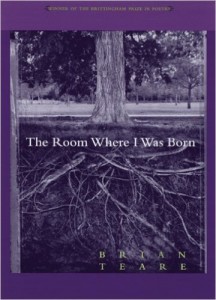 The Room Where I Was Born
The Room Where I Was Born
by Brian Teare
University of Wisconsin Press. 112 pages, $14.95
THE TITLE of Brian Teare’s debut volume of poetry, The Room Where I Was Born, proves apt: it is indeed about origins, about confronting how the room, house, family, town, and finally trauma of our childhood can shape our relationship to self, language, and even our view of history.
Poetry is often said to “disturb”; Teare’s poetry disturbs, not only in the usual sense of to “trouble” or to “break the tranquility of,” but also in the sense that one can disturb a stationary object, say, a glass of water, knocking it over, spilling its contents, breaking the glass. At times, the spilling is wonderfully messy: “Here, what hungers is lovely / cruel, is gore & gorgeous & godless. It knows / spots quickest to goad blood to bruise, / the gasp & spasm & green of smothering.” And as any good poet must, Teare also deftly carves out meaning from the rich suggestiveness of sound: “‘haus’ that sibilant hiss haunts / the end…” The first section of the book is devoted to telling in different ways the story of the narrator’s brother’s predatory sexual abuse and a family “turned against itself.” One of Teare’s strengths is his use of fairy tales and folk myths to layer his story, to heighten the sense of drama, when creating his haunting (and haunted) world. In his myth of Sleeping Beauty, the sleeper is raped in her sleep by Prince Charming. In another poem, “The Milk-Father,” a man lures young boys out into the Alabama woods and feeds them milk from “a row of swollen, hairless teats.” In a different vein—but adhering to a similar lyric strangeness—Teare’s most heartbreaking, poignant poems are about teenage sexual encounters with a married man. What makes these poems unique is Teare’s exploration of regret. The poet turns memory into a very present anguish, as a former self negotiates a line between love and hate, feelings he can’t balance out. Even so, in a poem titled “Trick Noir,” the speaker tells his younger self to forgive himself for “the need they’ll [tricks]leave behind.” In Teare’s hands, beauty and regret are artfully married in images like “the crushed corsage his underwear makes on the floor.” Teare’s poetry at its core is interested in highlighting the strangeness of language. Readers will see this from the very first page in an untitled poem that begins, “Say it was father bought the word and made it his with a picture.” The poem also introduces readers to Teare’s interest in the subjectivity of the I and the relativity of language. In the grammar of his poetry, the I is “outside the poem,” sitting on a porch, dragging on a cigarette, pondering “how a narrative’s ending denotes another beginning,” as he puts it in one poem. “When I say ‘I’ I mean eye, sum of my watching,” he writes in “First person plural is a house.” The poet uses grammar, language, and even punctuation to distance the speaker (himself, one assumes) from the story, such as placing passages in brackets when experienced by “the boy,” his childhood self, or referring to himself in the third person. At one point he turns the pain of being raped into the language of language itself: “[pain / predicated on correct grammar, / syntax: subject / verb object.]/ And what of blame? / Who? With what syntax?” With his devious plays on grammar, his talent for finding the strange incantatory spell in language, and his ability to create new myths, Teare might prove to be one of the stand-out younger poets writing today. The Room Where I Was Born won the 2003 Brittingham Prize in Poetry from the University of Wisconsin.




